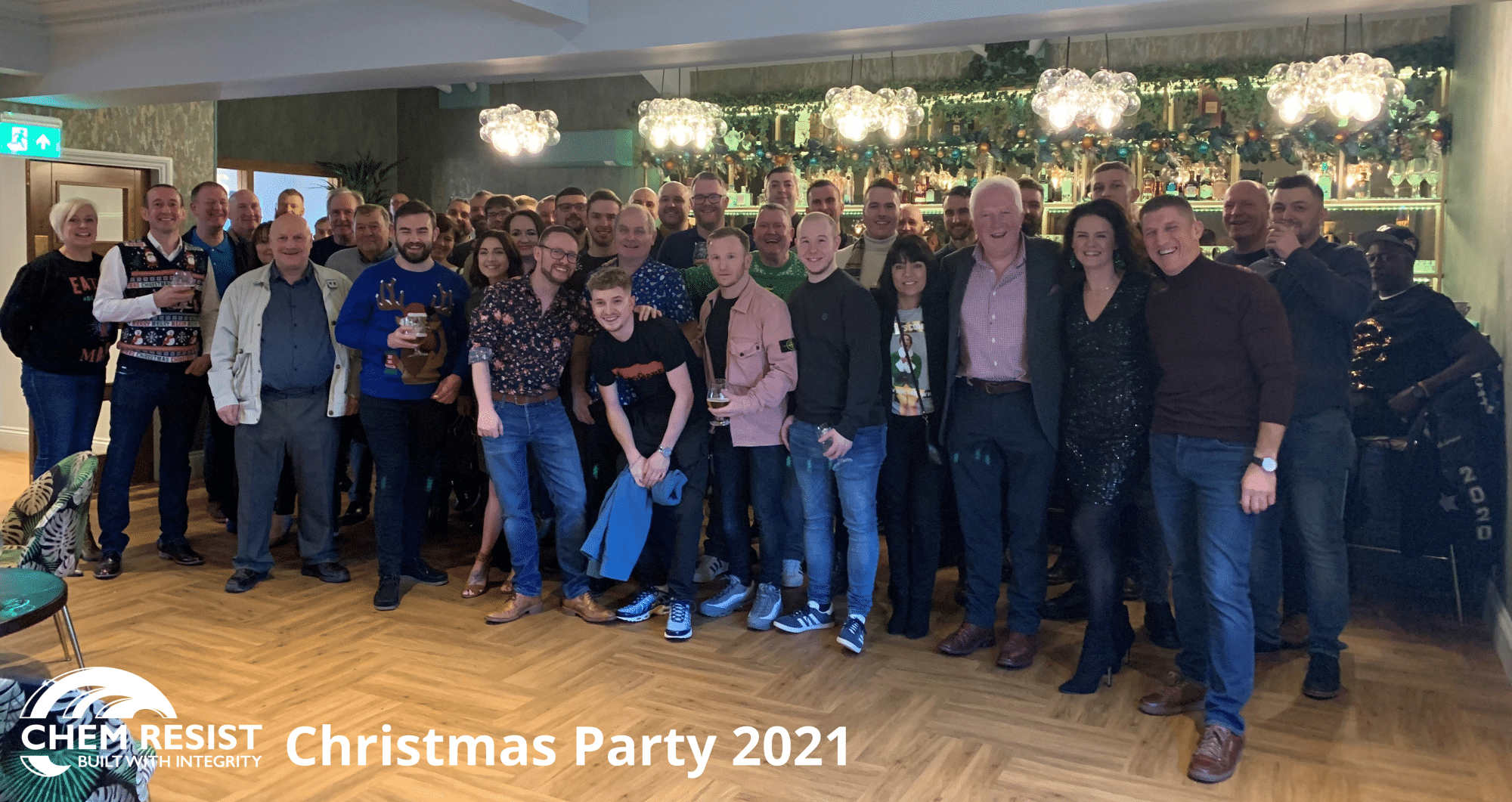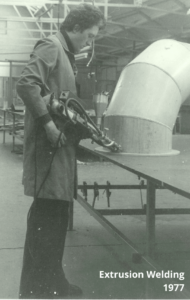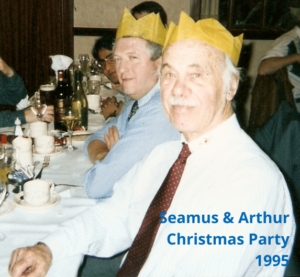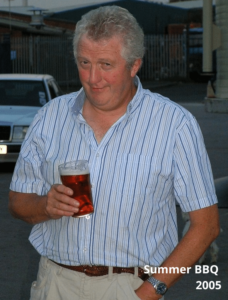“I do love a good gathering”
 As we near the end of 2021, after 44 years at Chem Resist we’re celebrating the retirement of Seamus Quinn. We take a look back with him at his career, moving up North, rugby and singing…
As we near the end of 2021, after 44 years at Chem Resist we’re celebrating the retirement of Seamus Quinn. We take a look back with him at his career, moving up North, rugby and singing…
‘I was born in 1953, came over from Ireland in 1955 to Plymouth in Devon, where for the next 20 years my parents ran pubs. Between 1973-75, I went to the University of London to study Biological Sciences (Chemistry and Biology) and I was also the Union Treasurer. Of course, coming from a family that had run pubs all their lives, they’d said to me, “The union bar does not make any money”, and I said, “That’s impossible!”. We then made so much money we were able to buy a minibus.
In my last year at university, there we’re loads of Yorkshiremen in my college, lads from places like Pontefract and Castleford and I said, “Where the bloody hell is that?” Myself and the Union President, who came from ‘uddersfield, said we’d do the Pennine Way. I used to do a lot of walking and I was in the rescue team on Dartmoor, so the two of us set off to discover the North from Derbyshire and he left me at Skipton because he hadn’t done any training. So, I spent the next two weeks walking on my own and that’s how I learned about the North; I basically walked it, before that I’d literally never been north of London.
The accountant for my college said I was wasting my time going into science and I should join an accountants or management consultants. So, I went and joined Arthur Anderson, I did 2 years with them in London. Pubs seem to come into my life quite a lot actually, we did a management survey for Watney’s, then I worked in the Treasury and then I fell out with them. They were so mechanical, no kind of entrepreneurial flair at all.
 My girlfriend at the time was Arthur (Armitage)’s daughter and he said, “Well if you’re giving up in London do you fancy having a go at this?” And I thought he meant run it, but he meant have a go at doing it! So, I swopped a 3-piece suit for a boilersuit and ended up in Butt End Mills. Luckily, I was Chem Resist’s worst fabricator ever and somebody had to start writing quotes and doing costings, so I started doing that. At first Arthur said, “I’ll have to check everything you do”, which lasted about a week, and after a couple of weeks he’d not written any so I said, “I’ll tell you what, I’ll write the quotes and you sign them”, and after about 2 weeks he didn’t bother signing them. So, I was in charge of that!
My girlfriend at the time was Arthur (Armitage)’s daughter and he said, “Well if you’re giving up in London do you fancy having a go at this?” And I thought he meant run it, but he meant have a go at doing it! So, I swopped a 3-piece suit for a boilersuit and ended up in Butt End Mills. Luckily, I was Chem Resist’s worst fabricator ever and somebody had to start writing quotes and doing costings, so I started doing that. At first Arthur said, “I’ll have to check everything you do”, which lasted about a week, and after a couple of weeks he’d not written any so I said, “I’ll tell you what, I’ll write the quotes and you sign them”, and after about 2 weeks he didn’t bother signing them. So, I was in charge of that!
So, I’d moved and I didn’t understand a bloody word anyone was talking about, but the fish and chips were fantastic. I knew one person north of London and he was a dentist in Bradford, and he couldn’t play rugby as he had to protect his hands. So, I joined Cleckheaton Rugby Union Club and that was the best thing, from knowing one person I knew 30-odd people. I’d phoned them and they’d said to come down on Saturday. So, I turned up at the pitch at the allotted time and this committee man said, “You Quinn?” I said, “Yes”, he said “Have you got your boots? You’re on!” It was behind Spen Baths in Cleckheaton, I came on because they were short and everyone gave me a round of applause, which was lucky because they gave me the round of applause before they saw how well I could play. I don’t think I’ve ever got a round of applause since! My rugby has always been played with enthusiasm but I’m bloody useless, so I’ve always been team captain, shouting and balling at everyone, motivating people, going on tours and doing stupid things. We had some great times.
Arthur Armitage, was the biggest influence on my career; a very clever man, bit of a visionary in the sense that he was one of those people, and you’ll know them, if he liked Vauxhall cars there wasn’t another car in the world and then when he stopped liking Vauxhall cars, he then liked Saab cars and there wasn’t any other car in the world. He was completely focussed and had some really good ideas. He spoke fluent German; he learned his German in China. There was a dye house in Ravensthorpe and that’s where he did his apprenticeship, but of course at that time to become the dyer it was dead man’s boots. So, at 21, when he finished his apprenticeship, he joined a company in Shanghai. He’d only been to London once, so the second time was to go for an interview with a company called Paton & Baldwin who were massive in the Far East and made yarn. He got the job and went to Shanghai. He used to play football with some German lads who stayed in the YMCA and worked for the big export companies, and he learned German to get to know them. The Japanese started bombing Shanghai from the Yangtze River, then invaded the city and he only just managed to get out with his life and went to Australia.
 Germany was at the absolute forefront of plastics, so with Arthur we had somebody who could sit in a German Boardroom and speak in German with them, so that made them a lot more comfortable. The opening gambit used to always be, “Arthur your German is very good, where did you learn it?” And he’d say, “Shanghai” and they’d go, “Eh? What?”. Plus, because he’d also worked in China and came back after the war and then back to Shanghai, he never worried about going anywhere. If you said to Arthur, “We’re going to America to talk to some pump people”, he’d pack a bag, he was off. He’d go anywhere, phenomenal man.
Germany was at the absolute forefront of plastics, so with Arthur we had somebody who could sit in a German Boardroom and speak in German with them, so that made them a lot more comfortable. The opening gambit used to always be, “Arthur your German is very good, where did you learn it?” And he’d say, “Shanghai” and they’d go, “Eh? What?”. Plus, because he’d also worked in China and came back after the war and then back to Shanghai, he never worried about going anywhere. If you said to Arthur, “We’re going to America to talk to some pump people”, he’d pack a bag, he was off. He’d go anywhere, phenomenal man.
I always said Chem Resist would do well because we understood the chemistry. So, an engineer might come looking for a tank or a piece of pipework or something, but what he really wanted was someone to say, “This is the plastic you want to use and it will work”, to give them confidence. Engineers are good at doing all the mechanical bit, but plastics have always been what Chem Resist’s about.
During the ‘90’s we got involved in the European Standard and the TWI (The Welding Institute) based down in Cambridge, we became their practical arm so we became their UK experts in the European Standard for tank design. Before that, tanks were made to a thing called, ‘Good Engineering Practise’, so all that happened was that someone said a tank should be 20mm thick and someone else came along and said no, it only should be 6!
I’m really proud of our involvement in the European Standard, which basically took 6 years, in the end we all worked together and pushed it through. The Spiral Winding technique was a great mechanical move forward, but more expensive than sheet. In 2000, the standard was published and off Spiral went. If you’ve got good chemical back up, you understand the mechanics of it and you’ve got professional standards, then you can grow. We’d got all three, so we did! If you then combine that with our approach, it makes us dead easy to work with. We’re not awkward about things. We work with engineers, who in their lifetime have all dropped goolies, they wouldn’t be an engineer if they hadn’t made a mistake. And the trick is to not go, “Oh we’ve never made a mistake”, but to admit you make mistakes and get on and fix it. The trick is to not back away and have nothing to do with it, but to say, “What do we need to do to sort it out?”. So, that’s why our old customers stay with us and our new customers stay with us. Better ways of doing something might come up, but that philosophy has always run through.
We did have a dalliance with international fabricating, we set up a fabrication organisation in The Czech Republic. In about 1999, one of the lads we’d taken on from Huddersfield University went out to run it. As it happened, he had a Czech girlfriend at the time and his Czech was much better than anyone else’s, all that he could say was, “I love you”, but it seemed to work with the customers. It was the time when The Czech Republic was dirt cheap and you could take the full works out, which I think at one time there were 15-20 people, and we’d just go on the beer in Prague. What a good gas that was, for about £50 you could take them all out for a good night including a meal.
 I do love a good gathering. I got people together for my 60th, we took a barn up in the Lake District and invited everyone along. It had some fields around it so people could camp or stay locally. It was supposed to be on Saturday and Sunday, we started on Thursday and finished on Tuesday; it was a good do. We had another one when I was 65 and that was another good do. I just enjoy getting a lot of people together, it’s the best fun.
I do love a good gathering. I got people together for my 60th, we took a barn up in the Lake District and invited everyone along. It had some fields around it so people could camp or stay locally. It was supposed to be on Saturday and Sunday, we started on Thursday and finished on Tuesday; it was a good do. We had another one when I was 65 and that was another good do. I just enjoy getting a lot of people together, it’s the best fun.
Looking back, I’d try and be a better accountant, but my advice to the young Seamus would be just have a go at it and definitely stay up North. I’ve spent 45 years up here and we are blessed with what you can do, with the glorious countryside and they are good at singing up here. The trick with singing is song sheets. I’ve taken 40, hairy-arsed, big rugby players all over Europe and we always have a song sheet in our pockets. As long as people have got the words they can make a go of it, most people can’t get beyond the first two words of a song, but with a song sheet it’s great fun. Singing, it’s the best fun.
I used to be in a Gilbert and Sullivan group and it got to the stage where I was doing that, playing Rugby and Mountain Rescue. I’d joined Mountain Rescue back on Dartmoor, then when we came up here, I phoned up and said “Are you taking anybody on?”, they said, “Yes! Come on”, but I left them for about 8 to 10 years. I worked on the basis that Mountain Rescue I could always go back to, singing I could always go back to but if I gave up playing rugby I couldn’t go back. I was supposed to finish playing rugby at 38, but I must have missed that and I finished at 50. So, I went back to Rescue Team and I phoned them up again and said, “Are you taking anybody on?”, and they said, “Of course you silly old bugger”, and I’ve been with them ever since. I’ve just got my 30 years certificate, but now I’m 68 this year, and you don’t really want to be picked up on the hills by a 68-year-old because you’d be more worried that you might have a broken leg, but he might fall over on you.
“What will I miss about Chem Resist?” Well, I’ll still be very much involved as Chairman at Board level, but what I will miss is the challenge of when someone sends you an enquiry or gives you a ring and straight away your mind starts working, “What’s the best way to solve this?”. Quite often some of the ideas that are put forward are not the best way of doing it, only because that person hasn’t had any experience, but you might have solved it somewhere else so you can say, “You can do it like this” and have a conversation. I’m finding talking to people is a bit of a lost skill, people will go, “Well I’ve emailed them”, but what you should do is just pick up the phone and talk to them. That brick you’ve got in your hand that you never put down, it’s for phoning people. I think you can make a first impression by talking to someone on the phone, chatting to them you get a feel for, “No, that’s exactly how I want it” or, “Oh yes, that’s an interesting idea”, and of course that puts your competitor one behind, because he’s just doing exactly what’s on the piece of paper.
So that sort of challenge I will miss. I won’t miss the paperwork, no I’m not wildly enthused about paperwork, as Simon (Hewitt) will say and he’ll be pleased they won’t get anymore ‘Quinn Job’s’ with no paperwork which make people go, “Oh bloody hell! How did he do that?!”
I’m looking forward to more walking. I’m still doing Rescue Team and Scouting, I’m looking at going back to singing but I’m going to do more walking, I’ve still got lots of hills to do.
Back to Blog
